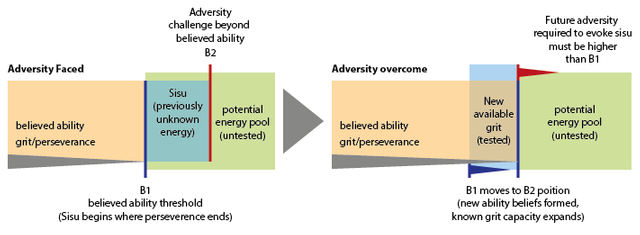
Sisu, a Finnish word that has no direct translation. In English, sisu may be described as the energy that lies past grit and perseverance to overcome adversity. Today I won't look at sisu directly rather, voice a few thoughts and questions about the other side of the equation: Adversity.
If Sisu is the energy used to overcome adversity, it is important then to understand what is to be conquered. Adversity by definition is: adverse or unfavorable fortune or fate; a condition marked by misfortune, calamity, or distress. For me, I don't think this really describes adversity well because, as you can probably gather, this all seems to be very subjective. What is calamity, distress or unfavourable fortune? These terms would be very heavily dependent upon the one experiencing them.
In Finland, I have heard numerous times how an ice hockey team or player used sisu energy to succeed in difficult conditions. It has been mentioned in regards to business success as well as political and industrial maneuvering. When I first arrived in Finland some 13 odd years ago, clients would often give me mini Finnish history lessons to bring me up to speed. Many broached the subject of past wars and battles where inevitably, the term 'Finnish Sisu' would be called upon to describe how Finland managed to survive. How does the survival of a war compare to a tough hockey game on the adversity index?
If sisu begins where determination, perseverance and grit end, wouldn't the point of beginning be dependent upon how much grit and determination one already possesses? This would mean that the starting point of sisu for any particular individual could vary wildly from that of another, as would the adverse events required to call upon the sisu reserve. This makes the adversity level of events required to induce sisu highly personal and incomparable to the experiences of another, even if the events themselves are comparable.
"Through high school I lived a life of adversity. You see, I had an iphone 4 when all of my friends had a 5 and some even a 6. It was a tough time but my sisu got me through."
Is this what we could hear as stories that demonstrate sisu? Does this provoke us to ignore the odds and inspire us to jump into the fray? Which situations bring out our own strengths and hidden reserves? Is mild adversity enough or does it require gut wrenching, muscle ripping, physical and mental struggle where failure or success is balanced on a razor's edge? Perhaps an extremely adverse event to one may seem relatively mild through the eyes of another. Can an observer judge?
When it comes to judgement, sisu seems to be something that can be guessed at through third-party observations but not actually measured. Like a 1-10 pain scale, it is only relevant to the individual experiencing it and the threshold for one may be much, much higher or lower than that of another. The judgement would also depend on what types of events the observer believes worthy or unworthy of even attempting and their personal experiences and attitudes. I also suspect that when it comes to observing sisu by the actual individual experiencing it, there would be no available energy to pay observational attention, as all would be allocated to the adverse sisu-evoking task at hand. It is perhaps possible to see in reflection but, when looking back, does one realise that the grit/sisu threshold was crossed, or does survival itself prove that there was actually more energy within?
Then, if we are interested in experiencing sisu and growing resilience we would have to think if our lives offer the type of adversity that inspires sisu to get involved? We live in a society where we protest the loss of a few holidays and demonstrate because we believe we don't have enough to help people that have fled war zones. We will argue against measures that place financial discomfort upon us and shy away from making personal and policy changes although the current and future environment demands them. We ask others to look after us in many different ways, blame them if they fail to reach our expectations and get offended and target them if they say or do something with which we disagree. We continually judge everyone else based on their actions and circumstances yet fight for our right not to be judged ourselves. There is already a life filled with conflict, and much of it seems self-inflicted, but is it sisu inducing?
To experience sisu we have to face adversities that challenge us beyond our own expectations and beliefs of what we think we can do. Which would mean, doing what we think is for us, impossible. But, most people will instinctively not test personal limits that defy the odds because of the likelihood of failure and certainly not willingly attempt the impossible. Alternatively, we could experience sisu if the adversity we experience is not chosen, but thrust upon us by external factors, however, our common practice is to fight against anything that we expect will put us in discomfort, let alone awaken the sleeping sisu giant inside. We seem to want to believe sisu is within us, but will actively avoid the adverse situations that would prove it.
A poor diagram attempting to show the move:

Regardless of whether sisu usage is realised or not, dipping into the reserve would promote an expanded 'believed ability' capacity for future use since it has been proven in practice and repeatedly doing so would continuously move the boundary and create a highly resilient individual. If one adverse event expands the grit capacity, does this translate into the ability to handle a highly diverse adverse event?
Personally, when I look back at my life, I have pushed through some very difficult times, but in reflection, were they that difficult? I now think I had much more reserve than the struggle suggested and perhaps didn't come as close to using 'sisu' as I thought I did at the time. Maybe I underestimated myself then because I didn't understand a wide range of adversity, perhaps I now overestimate my abilities because I think I have already faced the most difficult. It is highly likely that with my personal growth, the troubles of the past now appear insignificant. In hindsight, I feel I was much more than a little naive, and looking forward, I think I will look back at now and think the same again. We can believe in something without it being true, but truth itself doesn't require a belief. Should I find out where my true limits are or, should I trust where I believe them to be?
In my opinion, adversity does not need to come through a struggle against the negative, it can come through a journey for the positive. It doesn't have to be brought on by misfortune, distress or calamity. At least not in the way we generally define it. Sisu and its benefits could come through deliberate choices to push ourselves into adversity by tackling what we believe to be impossible for us, but worthy of our energy investments. The breaking of familiar structures and concepts and venturing into new fields, yet to be formed technologies and methods that are still only dreams. To learn about and collaborate with people, cultures and nations that are unfamiliar, uncomfortable to build stronger relationships and better solutions. To invest in the unknown, investigate the unexplored and attempt to do what has never been done. The undiscovered always lives in adversity until found and the path to a better world is impeded by those unwilling to look. Of course, negative events will still appear along these paths also but, rather than trying to avoid them, we can aim for something far greater and they will help us achieve it.
Sisu may begin at the end of our known abilities, but not the end of our ability because if there is reserve, there is fuel to learn more, understand deeper and move further. Sometimes the steps seem too big and our legs too short and we question ourselves and our power to continue, yet here we are, continuing. And, if we know that sisu is there, why are we afraid to go further than what we believe are the limits? Why not test our impossibles? When we look back, the moments we revere, the ones that have shaped us, the ones that have become a part of our story, many of these are born from difficulty and pulled from adversity. The great leap forwards in things such as technology and education, social welfare, human rights and medicine have also been pushed through uncertainty and adverse conditions. Adversity becomes the catalyst for fulfilling our potential, avoiding it creates our ceilings.
“Impossible is just a big word thrown around by small men who find it easier to live in the world they’ve been given than to explore the power they have to change it. Impossible is not a fact. It’s an opinion. Impossible is not a declaration. It’s a dare. Impossible is potential. Impossible is temporary. Impossible is nothing.” - Muhammad Ali
Like normal, these are just some thoughts that may inspire more thoughts and questions. Feedback and opinions are welcome.
Taraz
Exceptional writing piece about sisu !~
Downvoting a post can decrease pending rewards and make it less visible. Common reasons:
Submit
My ideas on it are slightly different to what the Finns hold. I feel that this post was written so long ago :)
Downvoting a post can decrease pending rewards and make it less visible. Common reasons:
Submit
Hi! I am a robot. I just upvoted you! I found similar content that readers might be interested in:
https://www.linkedin.com/topic/sisu
Downvoting a post can decrease pending rewards and make it less visible. Common reasons:
Submit
Some good stuff you've been posting so far. I think it'd be great if you could post some Steemit-exclusive content.
Downvoting a post can decrease pending rewards and make it less visible. Common reasons:
Submit
Thanks, I definitely will be.
I am getting used to the way things work here and will be posting exclusive content in the near future. Bear with me a little :)
Downvoting a post can decrease pending rewards and make it less visible. Common reasons:
Submit
Looking forward to it.
Downvoting a post can decrease pending rewards and make it less visible. Common reasons:
Submit